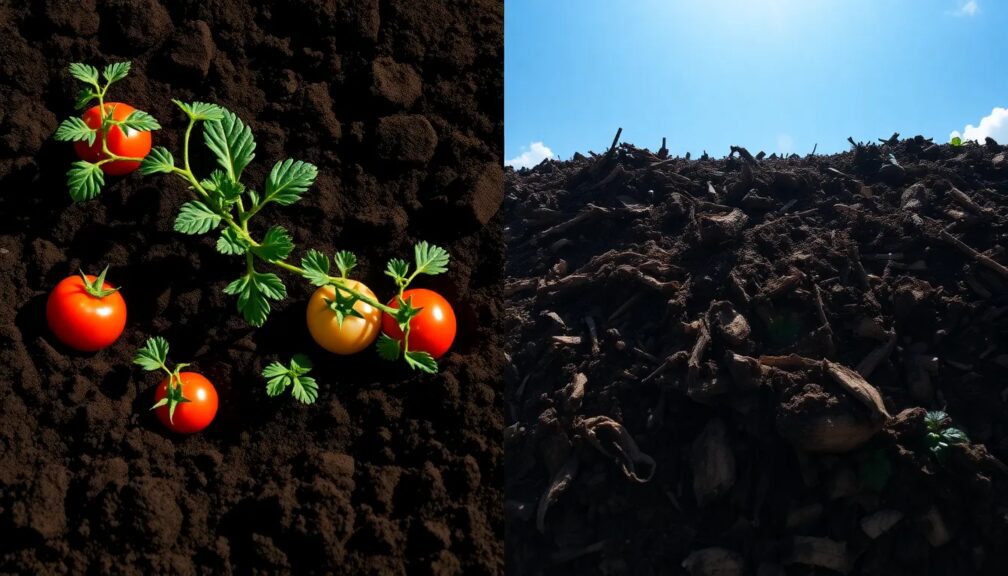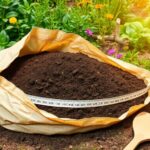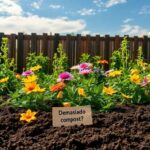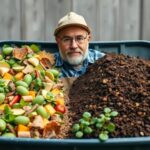Is topsoil better than compost for vegetable garden

Welcome to Our Exploration of "Is Topsoil Better Than Compost for a Vegetable Garden?"
Gardeners often ponder whether topsoil or compost is the superior choice for nurturing a thriving vegetable garden. The debate is a crucial one as the health of a garden starts with the quality of the soil. Topsoil, the uppermost layer of the Earth's crust, is known for its natural composition and ability to support plant life. On the other hand, compost is a rich, organic amendment created from decomposed plant and animal materials, boasting high levels of nutrients essential for plant growth. This article delves into the benefits and limitations of both topsoil and compost, aiming to provide gardeners with the knowledge needed to make an informed decision and cultivate a bountiful vegetable garden.
Should I use topsoil or compost for vegetable garden?
The question has lingered in the minds of countless gardeners, teasing their curiosity and challenging their green thumbs. As a gardener, your quest for the perfect vegetable patch may seem never-ending, but the secret lies in the soil itself. Imagine diving into a world where your vegetables are not just surviving, but thriving, bursting with flavor and vibrant health — this is the potential that the right soil mix can unlock.
When it comes to nurturing a flourishing vegetable garden, both topsoil and compost play pivotal roles, yet each boasts unique properties and benefits. Topsoil is the uppermost layer of the earth's crust, teeming with minerals and the basic structure needed for root development. On the other hand, compost is the rich, decomposed organic matter that gifts your plants with the nutrients essential for explosive growth.
The allure of using topsoil lies in its ability to provide a solid foundation. It's the bedrock of your garden's ecosystem, a haven where seeds can take root and begin their journey upward. But consider this: without the addition of compost, your soil could be likened to a skeleton without flesh — it has form, but lacks the substance needed to sustain life energetically.
Enriching your garden with compost is like unlocking a treasure trove of fertility. This black gold injects life into your soil, ensuring your plants are caressed by a symphony of nutrients that dance to the tune of natural growth. It's not just about the plants; compost invites a bustling community of microorganisms, worms, and beneficial insects that work tirelessly to keep your garden healthy.
But here's where the garden plot thickens. The magic truly happens when topsoil and compost come together in a harmonious blend, a gardening symphony that crescendos into the lushest of vegetable gardens. The integration of these two elements can create a soil structure that is both stable and nutrient-packed, a combination that might just have your neighbors peeking over the fence in awe.
As the sun sets on the horizon and the cool evening breeze whispers through the leaves of your vegetable plants, the question remains: which will you choose for your garden? Will you harness the elemental strength of topsoil, the nutritional prowess of compost, or will you unite them in a dynamic duo that promises a vegetable garden so enticing, so bountiful, that the fear of missing out on the harvest will keep you awake at night? The answer lies just beneath the surface, waiting for you to dig in.
What is the best soil to use for a vegetable garden?
Discovering the perfect blend of soil for your vegetable garden can be the secret to a bountiful harvest that will leave your neighbors green with envy. The quest for the ideal soil is not just about texture; it's a delicate balance of nutrients, structure, and moisture that can turn your gardening efforts into a success story.
Firstly, the magic word in the world of verdant gardens is loam. Loamy soil, which is a well-integrated mixture of sand, silt, and clay, provides a fertile bed that is beloved by root systems far and wide. With its stellar drainage and nutrient retention, it holds the key to unlocking the potential of your plants.
But wait, there's more to this tale of underground treasure. The addition of organic matter is a game-changer. Materials like compost or well-rotted manure not only add essential nutrients but also encourage beneficial microbial activity that fosters plant growth. This kind of soil amendment can turn a good soil into a great one, and here's why:
- It boosts the soil's ability to hold moisture, yet drains excess water, protecting roots from rot.
- It provides a buffet of nutrients, slowly releasing them in a form that plants can absorb.
- It improves the soil structure, making it easier for roots to penetrate and spread.
But how do you achieve this elusive perfection? The answer might be closer than you think, and the journey is half the adventure. Whether you're starting from scratch or aiming to enhance your existing garden bed, the transformation of your soil is a process that yields visible results that will have you rushing out each morning to witness the fruits of your labor.
Imagine your hands in the dirt, the satisfaction of nurturing life from the ground up, and the taste of a homegrown tomato that eclipses any store-bought imitation. The quest for the ultimate garden soil is just the beginning of a story that you will want to be part of. Stay tuned, roll up your sleeves, and get ready to dig deep into the world of loamy wonders!
Is compost or top soil better for raised beds?
When it comes to optimizing your gardening game, it's imperative to delve into the soil composition that will transform your raised beds into a horticultural haven. The debate between using compost or top soil is not just a garden-variety question—it's a critical decision that could lead to either a lush, bountiful oasis or a disappointing, barren plot.
Firstly, let's unpack the powerhouse known as compost. This rich, organic matter is a tour de force for soil health, teeming with beneficial microbes that enhance nutrient absorption. Imagine your plants with access to a buffet of essential nutrients, all thanks to the decomposition prowess of compost.
But hold up—before you make up your mind, there's the case for top soil. Often seen as the underdog, top soil can be the foundation for success in your raised beds. It provides a stable structure for plant roots and holds the potential for customization based on your specific gardening needs.
Choosing the wrong one could mean the difference between a thriving garden and a lackluster one. And let me tell you, once you've witnessed the sheer vibrancy of plants grown in the perfect soil blend, there's no going back. The key lies in understanding the unique benefits that each option brings to the table.
So, which one will unlock the full potential of your raised beds? The suspense is palpable, and your decision will shape the future of your garden paradise. Stay tuned as we dig deeper into the art and science of soil selection—you won't want to miss the vital tips that could elevate your gardening prowess to legendary status.
Why use top soil instead of compost?
If you're on the brink of diving into your next gardening project, you might be wondering about the secret ingredient that will ensure your greenery thrives. The answer may surprise you—sometimes, the magic lies not in the nutrient-rich supplements you sprinkle, but in the very foundation of your garden: the soil itself.
Top soil is the uppermost layer of the Earth's crust, and it's here where the majority of organic activity takes place. This layer is teeming with life, from microorganisms to earthworms, all contributing to a complex ecosystem that supports plant growth. By choosing top soil, you are laying down a bedrock of nutrients that will sustain your plants throughout their life cycle.
On the flip side, compost is often hailed as a gardener's gold, but what if I told you that its role is more of a nurturing supplement rather than a standalone solution? Compost is an amendatory substance, great for giving your plants a boost, but it may not provide the structural support that roots need to anchor and thrive. That's where top soil comes in, offering a balanced texture that facilitates root penetration and water retention.
Here's where the fear of missing out (FOMO) kicks in:
1. **Optimal Plant Support**: Pure compost can be too dense or too loose, potentially smothering delicate roots or failing to hold enough water. Top soil guarantees a just-right home for your plants.
2. **Sustainability**: Consider the environmental impact. Top soil is often locally sourced, reducing the carbon footprint associated with your gardening exploits.
3. **Economic Efficiency**: While compost is a fantastic addition, it can also be pricey. Top soil can often be purchased in larger quantities for less, giving you more bang for your buck.
But wait, there's a caveat. Not all top soil is created equal. The secret to reaping these benefits lies in selecting quality top soil, composed of the right balance of sand, silt, and clay, along with organic matter. Fail to pick a premium mix, and you might just find your garden underperforming, leaving you wishing you hadn't missed out on the top-tier stuff.
Is topsoil better than compost for vegetable garden reddit
If you're on the quest for the greenest thumbs on the block, you might be wrestling with one of gardening's most popular debates: the choice between topsoil and compost for your vegetable garden. You're not alone in this earthy predicament.
Imagine, your neighbors peering over the fence, astonished by the abundant, vibrant vegetables sprouting in your garden. They're not just green with envy; they're desperate to know your secret. What if the answer lies in the very ground your tomatoes and zucchinis are thriving in?
Diving into Reddit's garden-savvy communities might reveal a world of contrasting opinions and experiences, but here's a sneak peek that could give you the edge:
1. Topsoil can be seen as the garden's foundation, a native soil layer that offers a balanced structure for roots to anchor and grow. It's the bedrock of a traditional garden setup. But is it the optimal choice for your plants?
2. On the flip side, compost is the dark, rich gold of organic gardening. It's teeming with life, from microbes to earthworms, all serving the singular purpose of feeding your plants and promoting unparalleled growth. Could this be the growth elixir your vegetables are craving?
The dilemma isn't just a simple choice; it's a blend of science and art. Each option holds its own secrets to unlocking the potential of your vegetable garden. The consequences of your decision could mean the difference between a standard harvest and a yield so bountiful it becomes the stuff of local legend.
Are you ready to transform your garden and possibly your gardening philosophy altogether? Stay tuned as we delve deeper into the mysteries of soil composition, nutrient profiles, and the alchemy of garden success.
Discover the verdict from seasoned growers, and prepare to have your understanding of soil turned upside down. The answer to achieving that lush, enviable garden might be simpler than you think – or is it more complex? Don't miss out on the discussion that could revolutionize your approach to gardening.
Consejo final: For a flourishing vegetable garden, consider integrating both topsoil and compost. Topsoil provides a stable base, while compost enhances soil fertility with organic matter and nutrients. Balance is key for optimal growth and plant health. Wishing you bountiful harvests and joyful gardening!
 How much does a 40 lb bag of compost cover
How much does a 40 lb bag of compost cover Can you put too much compost in a garden
Can you put too much compost in a garden How long after adding compost can you plant
How long after adding compost can you plant What happens if you don't mix your compost
What happens if you don't mix your compost Is it OK to mix potting soil with topsoil
Is it OK to mix potting soil with topsoilIf you want to know more about similar articles like Is topsoil better than compost for vegetable garden you can visit category Gardening Tools.